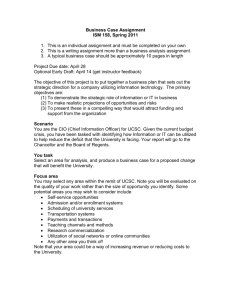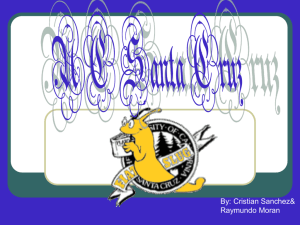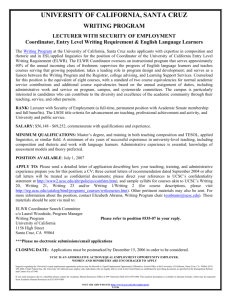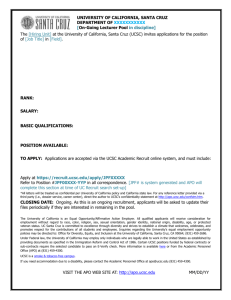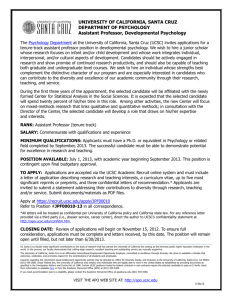Indirect Evidence for Program Learning Outcomes (PLOs) Assessment
advertisement
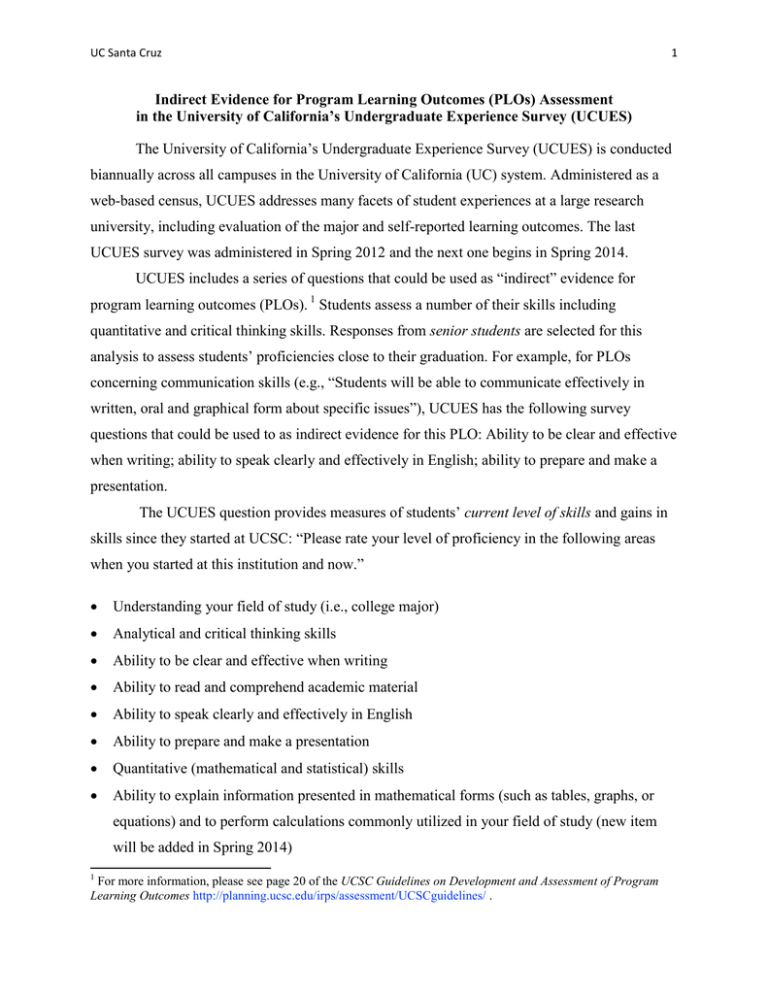
UC Santa Cruz 1 Indirect Evidence for Program Learning Outcomes (PLOs) Assessment in the University of California’s Undergraduate Experience Survey (UCUES) The University of California’s Undergraduate Experience Survey (UCUES) is conducted biannually across all campuses in the University of California (UC) system. Administered as a web-based census, UCUES addresses many facets of student experiences at a large research university, including evaluation of the major and self-reported learning outcomes. The last UCUES survey was administered in Spring 2012 and the next one begins in Spring 2014. UCUES includes a series of questions that could be used as “indirect” evidence for program learning outcomes (PLOs). 1 Students assess a number of their skills including quantitative and critical thinking skills. Responses from senior students are selected for this analysis to assess students’ proficiencies close to their graduation. For example, for PLOs concerning communication skills (e.g., “Students will be able to communicate effectively in written, oral and graphical form about specific issues”), UCUES has the following survey questions that could be used to as indirect evidence for this PLO: Ability to be clear and effective when writing; ability to speak clearly and effectively in English; ability to prepare and make a presentation. The UCUES question provides measures of students’ current level of skills and gains in skills since they started at UCSC: “Please rate your level of proficiency in the following areas when you started at this institution and now.” Understanding your field of study (i.e., college major) Analytical and critical thinking skills Ability to be clear and effective when writing Ability to read and comprehend academic material Ability to speak clearly and effectively in English Ability to prepare and make a presentation Quantitative (mathematical and statistical) skills Ability to explain information presented in mathematical forms (such as tables, graphs, or equations) and to perform calculations commonly utilized in your field of study (new item will be added in Spring 2014) 1 For more information, please see page 20 of the UCSC Guidelines on Development and Assessment of Program Learning Outcomes http://planning.ucsc.edu/irps/assessment/UCSCguidelines/ . UC Santa Cruz 2 Library research skills (e.g., finding books, articles, evaluating information sources) Other research skills Ability to participate in research and/or creative projects specific to your field of study (new item will be added in Spring 2014) Understanding international perspectives Foreign language skills Linguistic and cultural competency in at least one language other than my own (new item will be added in Spring 2014) Computer skills (removed from the survey in Spring 2014) Ability to appreciate and understand racial and ethnic diversity Ability to appreciate the fine arts (e.g., painting, music, drama, dance) Ability to appreciate cultural and global diversity Understanding of personal social responsibility Self-awareness and understanding Leadership skills (new item will be added in Spring 2014) Interpersonal (social) skills (new item will be added in Spring 2014) Ability to work with people from other cultures (new item will be added in Spring 2014) The first type of indirect evidence is student assessment of their current skills. The survey results are provided to the departments in a comparative format. Here is an example of senior students in a particular major rating their skills. Rate your current proficiency... UCSC Program Analytical and critical thinking skills 95% 5% 0% Very Good/Excellent Fair/Good Very poor/Poor Valid N Similar programs at other UCs 85% 15% 0% 19 UCSC Division (e.g., Social Sciences) 85% 14% 1% 54 262 UC Santa Cruz 3 The second type of indirect evidence you may be interested in is student gains in learning outcomes. Here is an example of how gains in skills are reported: Change since starting at UCSC Analytical and critical thinking skills Improved Stayed the same Decreased Valid N UCSC Program 95% 5% 0% 19 Similar programs at other UCs 85% 15% 0% UCSC Division (e.g., Social Sciences) 81% 19% 0% 54 262 Gains are measured based on a retrospective posttest design in which students are asked to rate their level of proficiency at two time points (when they started at UCSC and now). This method of measuring learning outcomes allows us to compute the change subjectively experienced by students in the program and is considered more accurate for program-level assessment than a pretest-posttest design.2 It is important to note that unlike the current level of skills, the gains are harder to interpret in a comparative context because the change in students’ skill level depends, in part, on the initial level of student skills that varies across majors and institutions. The length of study at UC may also impact the estimated gains: students who entered UC as frosh may have experienced larger gains in skills than students who were junior transfers. Questions and Feedback If you have questions, need additional information, and/or have comments about the survey and this report, please contact Dr. Anna Sher, Assistant Director for Assessment, at asher@ucsc.edu or by phone 9-4302. 2 Douglas, John Aubrey, Thomson, Gregg, and Chun-Mei Zhao. 2012. “The Learning Outcomes Race: the Value of Self-Reported Gains in Large Research Universities.” Higher Education. http://cshe.berkeley.edu/publications/publications.php?id=402
